#deryck barnes
Explore tagged Tumblr posts
Text





Stone Sandy Harbutt. 1974
Bunkers Middle Head – Gubbuh Gubbuh, Mosman NSW 2088, Australia See in map
See in imdb
#sandy harbutt#stone#ozploitation#australia#bunker#mosman#new south wales#motorbike#top hat#sydney#deryck barnes#hugh keays byrne#roger ward#rebecca gilling#movie#cinema#film#location#google maps#street view#1974#eye patch
12 notes
·
View notes
Text


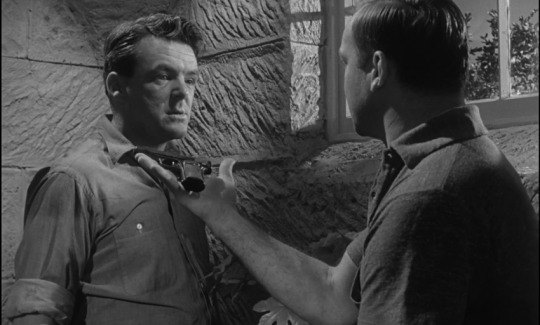

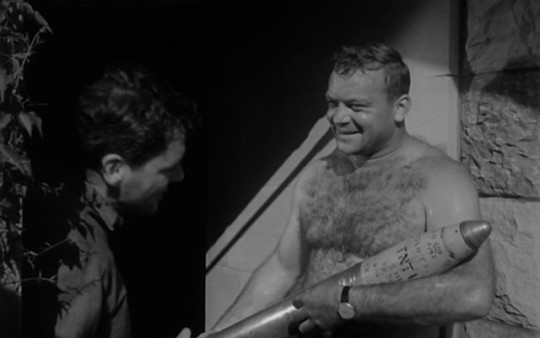
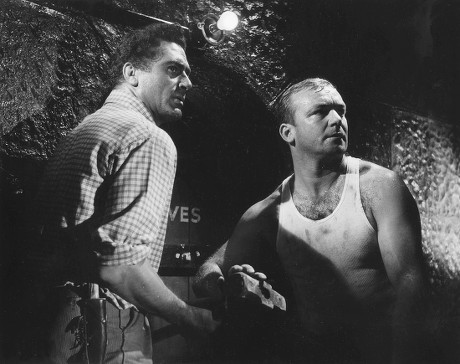
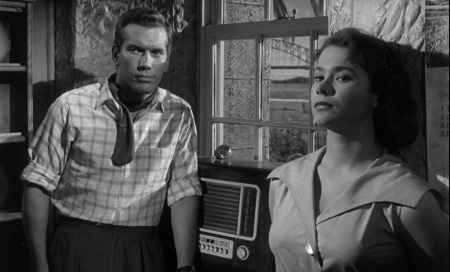
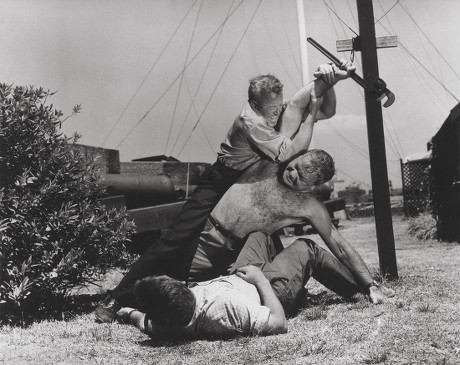
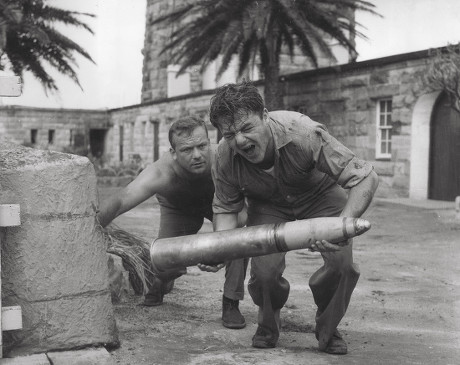
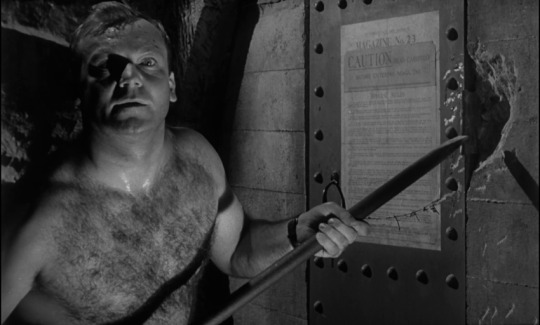
The Siege of Pinchgut (Four Desperate Men, 1959)
"No, we must evacuate the whole of the waterfront: Woolloomooloo, Potts Point, Darling Point."
"There's a lot of important citizens live over there, they're not gonna like it."
"Well, they're gonna like it even less if they get blown out of their beds."
#the siege of pinchgut#four desperate men#1959#british cinema#ealing studios#harry watt#jon cleary#aldo ray#heather sears#neil mccallum#victor maddern#carlo giustini#alan tilvern#barbara mullen#gerry duggan#kenneth j. warren#grant taylor#deryck barnes#richard vernon#ewan macduff#martin boddey#barry foster#interesting as a cultural artefact‚ as both an example of british screen obsession with Australia in the mid 50s to mid 60s (this is just#one of a whole series of Oz based films from Ealing in this era and tv was just as interested) and also for being the last ever Ealing#production. none of that is what appealed to me‚ i must confess; i saw that it starred barrel chested‚ gravel voiced Aldo Ray‚ and that he#appeared to be shirtless for much of the film‚ and i thought yeh there's a film i should watch. makes good use of its impressive sydney#locations but the emphasis here is more cerebral than visual; Ray's gradual transformation from righteous victim of a miscarriage of#justice to a genuinely dangerous figure who holds thousands of lives in his hands is well realised and sensitively drawn. not perhaps a#brilliant film‚ but one with a very strong central performance from an actor who never really got the dues he deserved#also someone on letterboxd pointed out that Neil McCallum looks like Keir Starmer and sadly i can't unsee it now
2 notes
·
View notes
Text
Deryck Whibley Announces Book Tour Dates
Deryck Whibley of Sum 41 has announced an upcoming book tour for his autobiography. Oct 08 White Eagle Hall Jersey City, NJ Oct 09 WBUR Cityspace Boston, MA Oct 10 Grammy Museum Los Angeles, CA Oct 11 Barnes and Noble Las Vegas, NV --- Please consider becoming a member so we can keep bringing you stories like this one. ◎ https://chorus.fm/news/deryck-whibley-announces-book-tour-dates/
0 notes
Text
Cool names for your future rockstar baby:
Matthew
Patrick
Benjamin
Derek (any spelling is fine)
Andrew
#I'm about to tag everyone I can think of hold on#matt kean#matt nicholls#matt barnes#Matty mullins#pat kirch#Patrick stump#Patrick foley#patty walters#ben bruce#ben barlow#ben langford biss#Benji Madden#Benjamin burnley#Deryck Whibley#derek discanio#derek sanders#yeah#I'm not messing around#Andy Hurley#andy mrotek#Andy biersack#I think there was another super common name but I can't think what it is
82 notes
·
View notes
Photo

Soturit / Stone (1974) Oxford Video ( leikattu 00 MIN 00) https://www.videospace.fi/release/bZSPXl9V 'Eräs poliitikko ammutaan. Murhan silminnäkijöinä on joukko moottoripyöräjengin jäseniä. Heistä kolme tapetaan julmasti pian tapahtuneen jälkeen. Poliisi nimeltä Stone onnistuu pääsemään jengin jäseneksi ja yrittää jäljittää murhaajan. Tehtävästä tulee verinen. Suuria moottoripyöriä, vauhtia, toimintaa, uskomattomia sijaisnäyttelijäsuorituksia. Ja kaikki tämä rajun musiikin säestyksellä. Elokuva on ollut suurmenestys Amerikassa ja Australiassa. Ei suositella herkille ihmisille!'
0 notes
Text
On January 24, 1916 a man from Hastings, Ontario enlisted with the 93rd Battalion, so beginning his military career.
We have one postcard and three letters from his overseas service, and they give us the opportunity to look a bit deeper into the war experience of Private John Edward Parker (reg. no. 195573).[i] Private Parker was a native of England, being born in the Lincoln, England region on August 10, 1889.
Having joined the Canadian Expeditionary Force with the 93rd Battalion Parker was sent to England with his battalion in July 1916 and sent a brief postcard to his mother upon his arrival in England.
Source: Deryck N. Robertson from the 18th Battalion Facebook Group.
Source: Deryck N. Robertson from the 18th Battalion Facebook Group.
July 24, 1915
Mrs J Parker Hastings Ontario Canada
Dear Mother,
Just a few lines hoping to find all well and to le you know that we landed cross safe. From J Parker
The short card, written one day prior to the R.M.S. Empress of Britain’s arrival at Liverpool, was a quick note to his mother letting her know he has arrived safely. It appears he wrote this card in preparation of landing in England with the realization he may not having time to write for some time as the battalion would be on the move to its training base and would begin the next stage of training in preparation for service on the Continent with the rest of the Canadian Corps.
Parker would soon find, in a space of 2-months, that he would be placed in a battalion that was not from his geographic region. Instead of a battalion from his region, such as the 21st Battalion – a battalion raised in Kingston, Ontario – Parker was assigned to the 18th Battalion, based out of Western/Southern Ontario. Arriving October 3, 1916, Parker would fight with the battalion until his second wounding on October 10, 1918.
The next communication from Private Parker is a letter written on February 28, 1917.
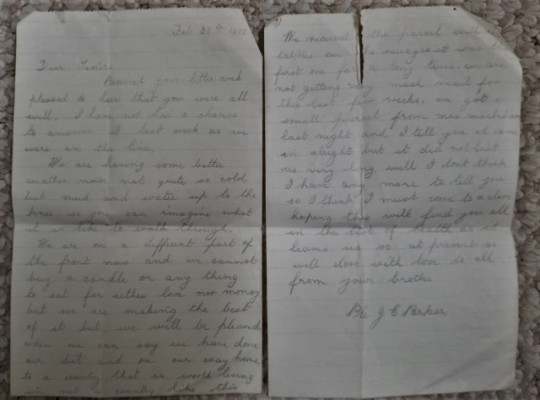
Source: Deryck N. Robertson from the 18th Battalion Facebook Group.
Feb 28th 1917
Dear Sisters,
Received your letter and pleased to hear that you were all well. I have not had a chance to answer it last week as we were in the line.
We are having some better weather now not quite so cold but mud and water up to the knees so you can imagine what it is like to walk through.
We are on a different part of the front now and we cannot buy a candle or any thing to eat either love nor money but we are making the best of it but we will be pleased when we can say we have done our bit and on our way home to a country that is worth living in, not a country like this.
We received the parcel with [the tabbles] and the sausages it was the first one for a long time. We are not getting very much mail for the last few weeks. We got a small parcel from Mrs. Markham last night and I tell you it came in alright but it did not last us very long. Well I don’t think have any more to tell you so I think I must come to a close. Hoping this will find you all in the best of health as it leaves us so at present so will close with love to all from your brother.
Pte. J E Parker
Parker had been in the field for five months. He joined the Battalion at the Somme and experienced some of the toughest action the 18th would endure. After the Somme, the Canadian Corps was moved to the Vimy Sector at the end of February 1917. The Battalion had moved out of the front-line on the 26th into the rear as Brigade Support and Private Parker had a chance to write home from his billet at one of three “shelters” (named Vistual, Rhine, Maison).
The letter aligns with the 18th Battalion War diary as it had been in the line prior to the letter. It had been a busy tour with the Battalion finding the trenches, “…in poor condition in several parts… This sector in very muddy condition necessitating continual work by the battalion to keep in repair.[ii] The tour in the lines was not without tragedy as the Battalion suffered two members killed in action and four wounded. It also relates the state of the trenches as Parker shares that the trenches had, “…mud and water up to the knees…”
He gives us insight to the nature of the rear area being isolated from larger population centers offering more opportunity to purchase supplies as the Battalion is based in a rural area, approximately 8 kilometres from Arras. He and his mates cannot acquire some of the comforts of home and the basic necessities, with candles being in high demand as the Battalion is stationed in three of the sub-terranean “subways” used by the CEF to shelter and hide troops from the German reconnaissance resources. Private Parker obviously prefers Canada to this part of France.
In closing, he relates how important a parcel from home was for him and one gets a sense of the value of such mail as Mrs. Markham’s “small parcel” did not last him and his compatriots very long. It was quite common for soldiers to share the contents of their parcels and add variety and interest to their diet from the contents of such parcels.
The next letter, dated December 22, 1917, is written after the battles at Vimy Ridge, Hill 70, and Passchendaele. Since the last letter, Private Parker’s service life has been eventful, being wounded on May 6, 1917, at Willeraval. On the night of May 5/6 the Battalion made a relief, “…under very heavy shellfire,” perhaps which led to Private Parker being wounded in the right arm. A month later he was discharged to duty with his Battalion. The nature of his wound was treated in the rear areas and did not require formal hospitalization at Etaples, France or over in England. Parker was promoted to the rank of Lance-Corporal on July 10, 1917, in response to the promotion of another soldier of the Battalion (C.W. Boyd, reg. no. 455590). It appears that complications from his GSW would lead to Parker suffering inflammation of the connective tissues of his right-hand. Five days of treatment off the line at the end of July 1917 resulted in the return of the newly minted Lance-Corporal Parker to the Battalion.
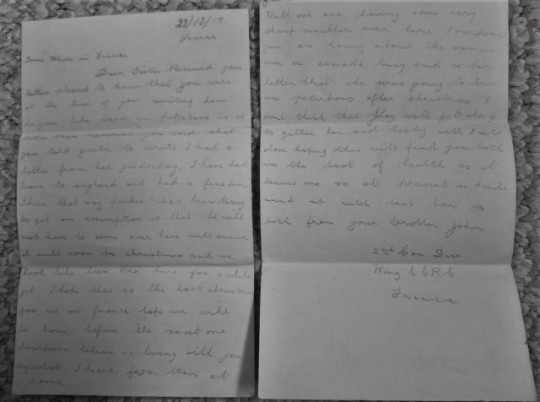
Source: Deryck N. Robertson from the 18th Battalion Facebook Group.
22/12/17 France
Some Where in France
Dear Sister,
Received your letter pleased to know that you were at the time of your writing. How do you like been in Peterboro[iii]? Is it better than Norwood? You said that you told Gertie to write. I had a letter from her yesterday. I have had leave to England and had a fine time. I hear that Roy Parker has been trying to get an exemption so that he will not have to come over here. Well Annie it will soon be Christmas and we look like been over here for a while yet. I hope this is the last Christmas for us in France. Hope we will be home before the next one. I supposes Lilian is living with you by what I heard from them at home. Well we are having some very sharp weather over here. I suppose you are having about the same over in Canada. [Ivey] said in her letter that she was going to live in Peterboro after Christmas. I don’t think that they will get along together. Her and Becky. Well I will close hoping this mite [sic] find you both in the best of health as it leaves me so at present [no I write run at] up with best love to both from your brother John.
2nd Can Div Wing CCRC[iv] France
There appears to be some confusion about where this letter was written. Taking the service records as a true representation of this soldier’s service from its entries for Parker he should still be with his battalion and this letter would then have been written at Febvin-Palfart where the Battalion was billeted in barns and homes in that community.[v] The Battalion had been out of the line for since December 13, 1917, and had been involved in voting in the Canadian General Elections on December 14 and then a series of parades and exercises until their move to Febvin-Palfart, where they became more serious about the training in the daily syllabi. But the closing of the letter clearly shows that Parker is detached from the Battalion and with the Canadian Corps Reinforcement Camp.[vi] This discrepancy between the date of the letter and the acknowledgement in his service record of his attachment with the Canadian Corps Reinforcement Camp was 2-months. His service record did not acknowledge his service with this unit until February 2, 1918.
This letter relates family gossip. We know that he is writing a sister by the name of Annie and she has moved from the village of Norwood[vii] to the town of Peterborough. Parker had a leave in England, though his service records do not, oddly, reflect this. He has concern for a possible member of his family, a Roy Parker, trying to get an exemption from the military. This part of the letter is illuminating as the recent election had conscription for the war effort as a major issue and the majority of serving soldiers agreed with this program. If Roy was a family member, then Lance-Corporal Parker, as a serving soldier, might have reason to be disappointed in his relative.
As he was writing so close to Christmas, he expresses a common sentiment about being ‘home for Christmas’, which would be an oft-expressed sentiment of the men of the Canadian Corps throughout the war. He would have to suffer one more Christmas overseas before going home.
Having participated in the Battles at Hill 70 and Passchendaele, he was on the roll of the Canadian Corps Reinforcement Camp at Lilliers, France on February 2, 1918. It is unknown what his role was there, but one of the roles that Parker could fill, especially with his combat experience, was that of a credible trainer of technology and tactics. In addition, as this camp established reinforcements for each battalion he would be a conduit helping to prepare and familiarize these new men to the culture of the “Fighting 18th”. He had valuable combat experience after 1-year and 3-months of active service through some of the hardest battles the Canadian Corps had experienced, and adding to his credibility, had been promoted in the field. This assignment lasted until August 29, 1918, when he was despatched back to the 18th Battalion.

Attachment of service record. Note that it does not show the date Parker left for the CCRC but does not that he in on the roll as of February 2, 1918.
The third, and last letter of the article, confirms that Parker was stationed at the Canadian Corps Reinforcement Camp prior to his service record’s entry to that fact. The entry for February 2, 1918, acknowledges that he is “on the roll” of the Canadian Corps Reinforcement Camp but does not note a date of departure from the 18th Battalion to the Canadian Corps Reinforcement Camp.

Source: Deryck N. Robertson from the 18th Battalion Facebook Group.
6/1/18 France
Dear Sisters,
Received your welcome letter and please to hear that you were well at the time of your writing. I had a letter from Fanny and she said that she was not feeling well she had an awful cold by what she said. She said she was lonely when I left but she had got over it she is expecting Earnest [sic] home on leave any time now. I received your parcel alright and [it] was ok and now I must thank you for it.
We are having some very sharp weather over here but not very much snow. It seems to be turning a little milder today. You said about R P[viii] not wanting to come over here to help as he must have cold feet or he would been over here a long time ago. I had a fine letter from E sister the other day, and she said she was well and hoped that I would soon being going on leave again. Well I have no news to tell you only that I wish the war was over and we could be back again to home. Well I will close hoping this will find you both in the best of health as it leaved me so at present. Will close with love to both from your brother J E P.
18TH Canadians BTN CCRC Wing France
In the new year, Lance-Corporal Parker writes his sisters a quick letter. He thanks them for a parcel sent to him and relates some family news about an ill relative and his hopes for another leave and the war to end. He refers to an “R P” having “cold feet” regarding his enlistment into the Canadian Forces. It is a brief letter that touches on some of the most common themes in wartime letters: leave, parcels, and a wish the war would end.
For Lance-Corporal John Edward Parker, the war would end. But only after returning to the 18th Battalion as The Hundred Days began during which he joined the Battalion “in the field” on September 3, 1918, at Beaurains, France while the Battalion was in Brigade (H.Q.) Reserve. Upon joining his Battalion Parker served until he was wounded again on October 10, 1918, during action near the L’Escaut Canal. That day’s butcher bill resulted in the Battalion suffering 6 other ranks killed and 70 wounded. Lance-Corporal Parker was one of those wounded with a GSW to his left leg (thigh) and he was admitted to No. 32 Stationary Hospital at Wimereux where his journey to “Blighty” and home would begin. His wound would heal relatively quickly, and he was transferred to Kinmel Park Camp and then returned to Canada and was discharged from service at Kingston, Ontario on February 10, 1919, and returned to Norwood and his family.
Lance-Corporal Parker’s experience in the Canadian Army resulted in being wounded twice, the first a minor “flesh” wound and the second more serious wounding that resulted in his transfer to England. By October 1918 the end was in sight for the war and the tempo of combat had increased. The last action Parker was involved in contrasted with this first wounding. There he was involved in static trench warfare. In 1918 the nature of the war had opened up and the combat was more fluid and dynamic. His letters home enhance our understanding of his service and, to this author’s experience, shows one of the few examples where the diligent record-keeping of the service records of a Canadian soldier had a gap when Parker’s service record did not accurately record the start of his assignment with the Canadian Corps Reinforcement Camp.
Sources:
Service Record
18th Battalion War Diary Transcriptions
Letters posted at the 18th Battalion Facebook Group
End Notes:
[i] These letters were posted at the 18th Battalion Facebook Group. The images of the letters are at the end of this article and have been transcribed by this author for clarity. This is to assist the audience with reading the letters but to get a true feel of the text please refer to and read the images.
[ii] This entry is an interesting aside and may indicate frustration in the maintenance of the line by the proceeding unit though the War Diary does not indicate what troops held these trenches before the 4th Brigade took them over. It appears that the 5th Canadian Brigade was the unit relieved by the 4th Canadian Infantry Brigade.
[iii] Common spelling for the now City of Peterborough, Ontario, Canada.
[iv] Canadian Corps Reinforcement Camp. This camp was established to channel soldiers for the Canadian Base Depot (CBD) at Etaples to the next stage of training and preparation for combat. From the CBD to the CCRC the soldiers would be moved closer to the front line. In the summer of 1917, the CCRC would hold for each battalion 100 reinforcements. These men would be further trained and prepared for the next assignment with an active unit. 10% of all other units (i.e. engineers, pioneers) would be held as reinforcements at this camp. The camp was moved in June 1918 to Aubin St. Vaast and the establishment of each battalion for reinforcements was increased to 200 other ranks and 10 officers.
[v] Mostly likely the officers were billeted in the homes, and the other ranks in the barns.
[vi] The Canadian Corps Reinforcement Camp was first established at Lilliers in the Summer of 1917 and then moved in June 1918 to Aubin St. Vaast.
[vii] It appears that the family moved from Hastings to Norwood, Ontario sometime after Parker joined the 93rd Battalion. He notes in his discharge papers that his proposed residence will be at Norwood.
[viii] Possibly referring to Roy Parker from the previous letter, dated December 22, 1917.
“…we cannot buy a candle or any thing to eat…”: Letters from Lance-Corporal Parker On January 24, 1916 a man from Hastings, Ontario enlisted with the 93rd Battalion, so beginning his military career.
#93rd Battalion#Canadian Corps Reinforcement Camp#Empress of Britain#Hastings Ontario#Kingston Ontario#letter home#Norwood Ontario#Passchendaele#Peterborough Ontario#service record#Somme#Vimy#wounded
0 notes
Text



Stone Sandy Harbutt. 1974
Fight Mort St, Balmain NSW 2041, Australia See in map
See in imdb
#sandy harbutt#stone#ozploitation#australia#fight#balmain#new south wales#deryck barnes#hugh keays-byrne#movie#cinema#film#location#google maps#street view#1974
14 notes
·
View notes